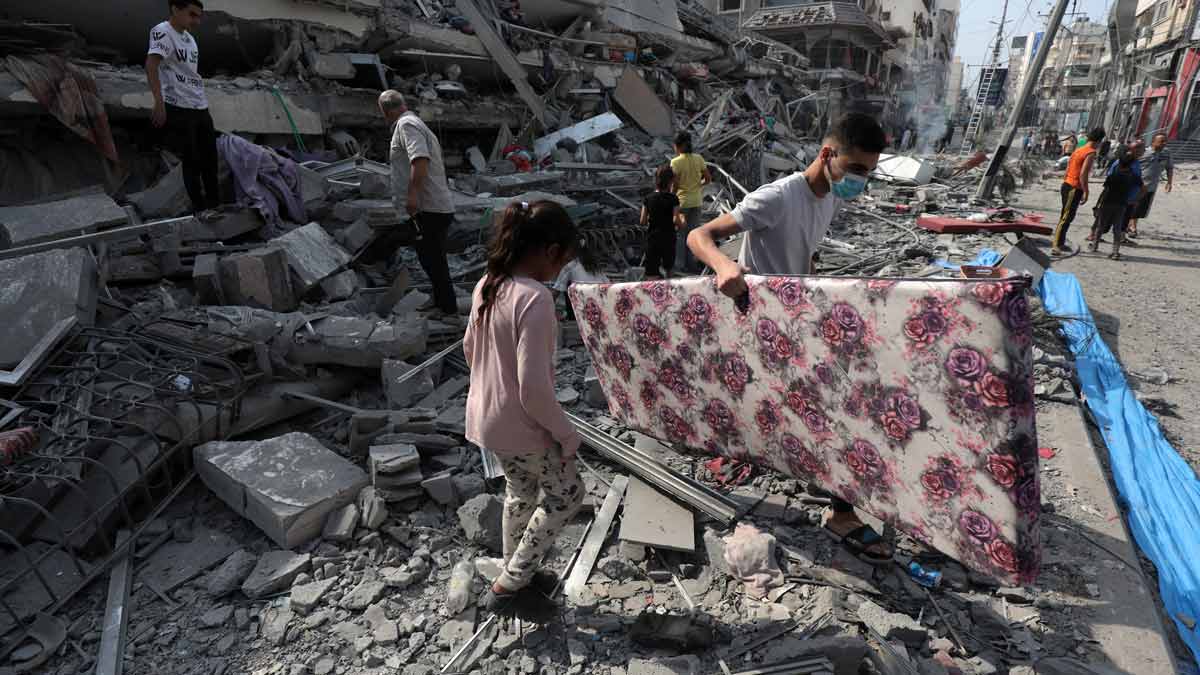
The ongoing conflict between Israel and Hamas has plunged Gaza into an unprecedented humanitarian crisis. With over 40,000 Palestinians dead, the region is not only grappling with the devastation of war but also with a severe health emergency. The scarcity of food, medical supplies, and clean water, coupled with the emergence of polio, has created a dire situation for the people of Gaza.
Table of Content:-
The Escalating Humanitarian Disaster
Since the conflict began following the October 7 attack and the abduction of Israeli hostages by Hamas, the situation in Gaza has worsened daily. Israeli air and ground offensives have decimated infrastructure, leaving civilians in perilous conditions. Over 40,000 Palestinians have lost their lives, with the death toll continuing to rise as the conflict drags on.
The Israeli hostages taken by Hamas remain in captivity, with no resolution in sight. The militant group has been using the hostages as leverage, demanding the release of Palestinian prisoners in exchange. Meanwhile, the civilian population in Gaza bears the brunt of the conflict, facing extreme hardships as basic necessities become increasingly scarce.
.jpg)
Food and Water Crisis
The blockade on Gaza has exacerbated an already dire food shortage, forcing desperate measures among the population. The United Nations previously reported that Palestinians were selling personal belongings to buy food, and in some extreme cases, children were consuming animal fodder to stave off hunger. The looming threat of famine has become a grim reality for many as the conflict continues to block humanitarian aid from reaching those in need.
The destruction of water treatment facilities has further compounded the crisis. With more than half of Gaza's drinking water now unsafe, the population faces the dual threats of dehydration and waterborne diseases. The World Food Programme (WFP) has been striving to deliver food to those in need, but the inconsistent supply and ongoing attacks have made it a near-impossible task. The WFP has urgently called for a sustained and uninterrupted flow of food supplies to mitigate the crisis.
Collapse of Healthcare Services
The healthcare system in Gaza is on the brink of collapse, with hospitals and medical facilities either damaged or completely destroyed by ongoing attacks. The already limited supply of medical resources has been further depleted, leaving the injured and sick with little to no access to essential care. More than 40,000 civilians have already perished, and countless others are injured, with little hope for proper medical treatment.
The situation is particularly dire for vulnerable groups such as pregnant women, newborns, and children. With critical medicines in short supply and many healthcare facilities non-operational, these individuals face life-threatening risks. The closure of the Rafah border has only worsened the situation, cutting off a vital lifeline for medical supplies.
The United Nations and global leaders have repeatedly called for a ceasefire to allow humanitarian aid to reach those in need. However, despite these pleas, both Israel and Hamas have yet to agree on a truce, leaving the people of Gaza to suffer in silence.
Polio Outbreak: A New Threat
As if the situation in Gaza were not dire enough, a new threat has emerged in the form of a polio outbreak. The World Health Organization (WHO) and UNICEF have both called for an immediate ceasefire to facilitate polio vaccination campaigns in the region. These organizations aim to administer over 1.6 million doses of the vaccine to cover 95% of the population and prevent the disease from spreading further.
The polio virus was first detected in Gaza in July, and experts fear that without swift action, the outbreak could spiral out of control. The ongoing conflict, coupled with the collapse of healthcare services, has made it nearly impossible to conduct the necessary vaccination drives, putting thousands of children at risk.
Also Read: Cholera Outbreak In Sudan Killed At Least 22 People, Says Health Minister
A Glimmer of Hope?
In a recent development, US Secretary of State Antony Blinken met with Israeli Prime Minister Benjamin Netanyahu to discuss a potential truce deal for Gaza. While Israel has reportedly agreed to a US 'bridging proposal,' there has yet to be any concrete progress toward a ceasefire. Blinken's upcoming visits to Egypt and Qatar are seen as critical to advancing these talks. Meanwhile, Hamas has announced the resumption of suicide bombings in Israel, further escalating tensions. The group recently claimed responsibility for an unsuccessful suicide bombing in Tel Aviv, signalling that the conflict is far from over.
Bottomline
The situation in Gaza is a tragic testament to the devastating consequences of prolonged conflict. With over 40,000 lives lost, and countless others in jeopardy due to food, water, and medical shortages, the need for a ceasefire has never been more urgent. As the world watches, the people of Gaza continue to endure unimaginable suffering, their future uncertain amid the ongoing violence.
Also watch this video
How we keep this article up to date:
We work with experts and keep a close eye on the latest in health and wellness. Whenever there is a new research or helpful information, we update our articles with accurate and useful advice.
Current Version